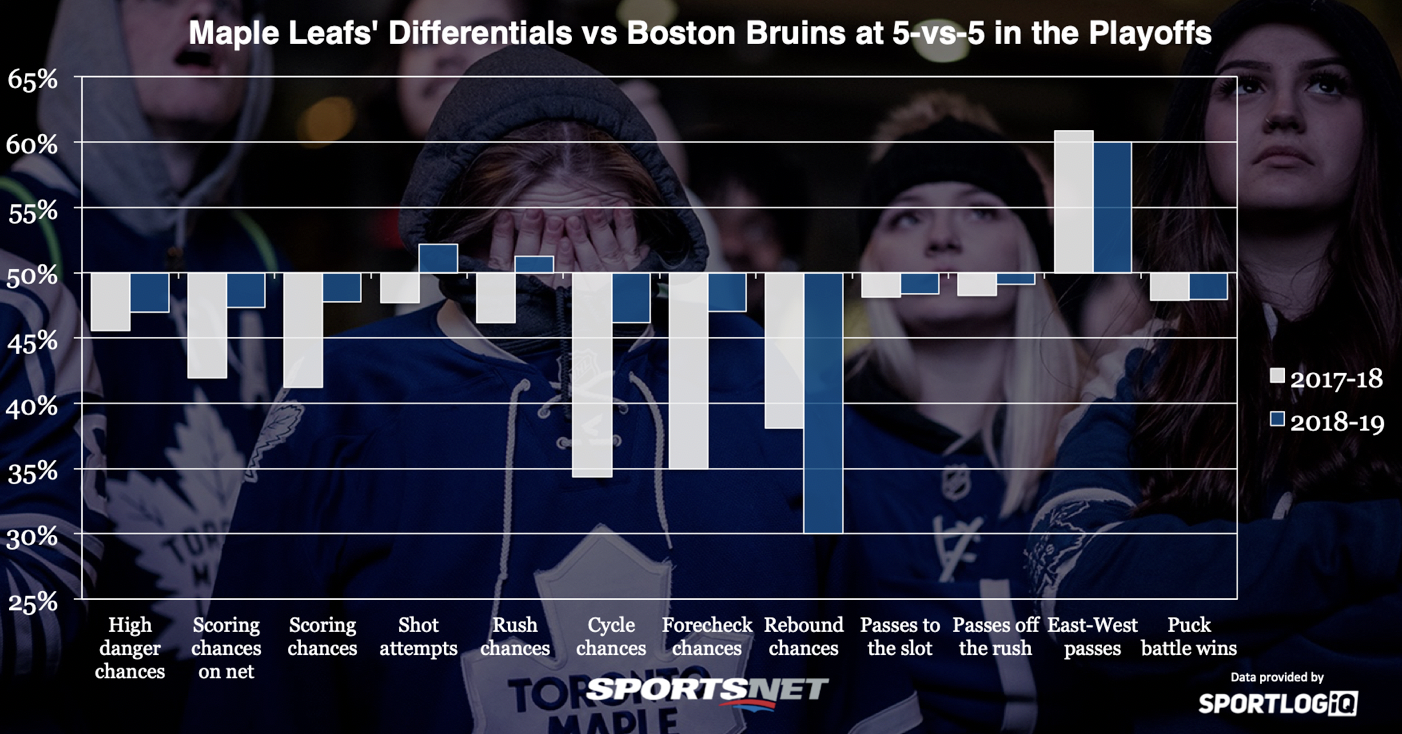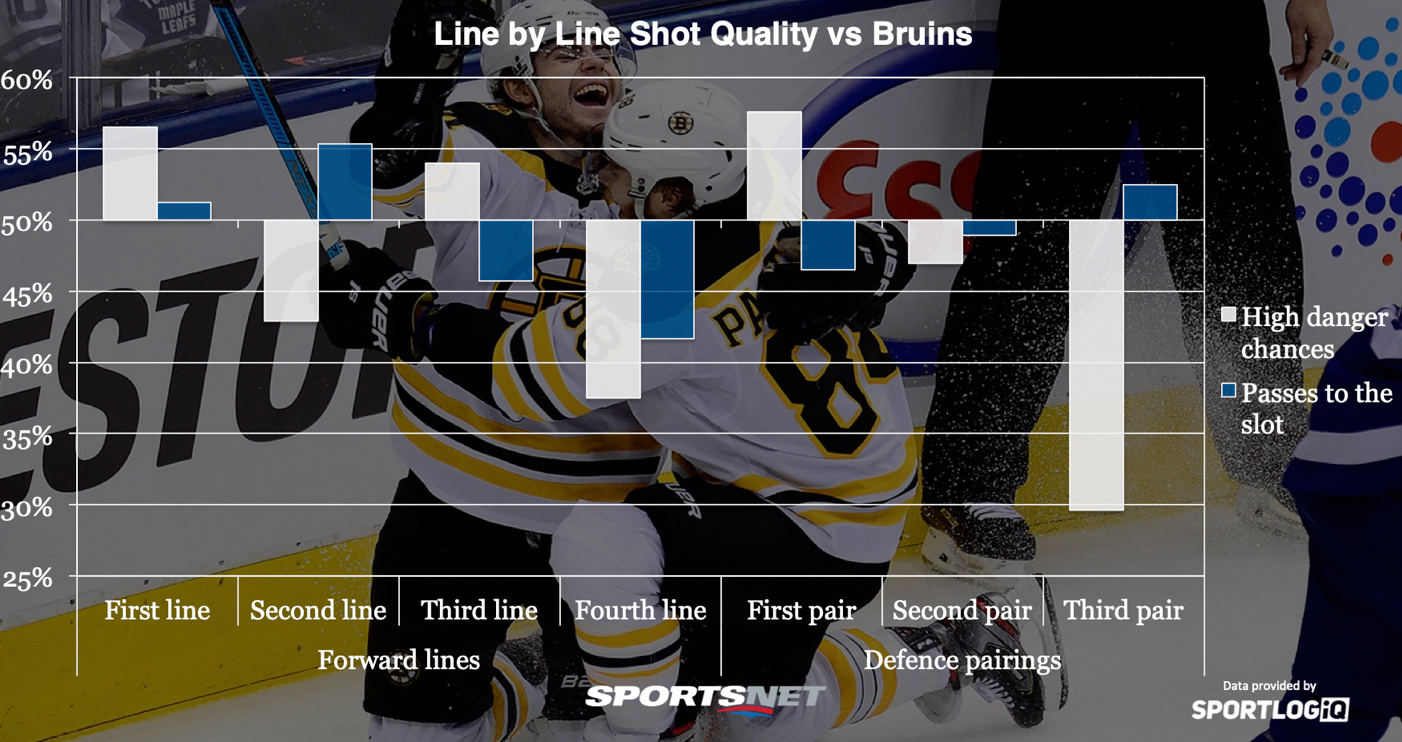For the third straight season the Toronto Maple Leafs have failed to make it out of the first round of the playoffs – and for the third time in seven seasons Boston eliminated them in seven games.
When Toronto lost to the Capitals in Round 1 two years ago, it was to be expected, and the positives from that series were obvious. A powerhouse team in Washington was pushed to six games by the young, upstart Leafs. The future was bright for all to see and the way the Leafs played was where hockey was trending: fast and furious and constantly in the slot.
Against the Bruins in 2018 the Leafs weren’t favourites by any means, but the potential for an upset was there. It took the Bruins a full seven games to triumph over the young Leafs, not to mention Toronto lost Nazem Kadri in the middle of the series to a three-game suspension.
This season, you can argue that once again the Leafs were not the favourites, but the Bruins were one year older, their regular season performance wasn’t as strong as last season, and Toronto had added two marquee players in John Tavares and Jake Muzzin.
[snippet ID=3322139]
However, similar problems that plagued the Leafs last year against the Bruins cropped up again this year. Kadri took himself out of the series entirely this time with a selfish play, and while Freddie Andersen was vastly better than last season, he struggled in Game 7.
The Leafs are still at the beginning of their competitive window. Auston Matthews is just 21, Mitch Marner turns 22 in less than two weeks, William Nylander turns 23 a couple days earlier, and grey-beard veteran Morgan Rielly just turned 25 last month. But that excuse seems to be getting a little tired for Leafs fans who want some success to go with the dump truck full of hope they’ve been spoon fed for the past few years.
The way Game 7 went, you could even argue Toronto was less impressive than last season in the playoffs, but looks can be deceiving. So aside from the Kadri suspension and Andersen letting in a couple questionable goals after a great series, what went wrong for the Leafs this time? Let’s break it all down.

One of the big narratives surrounding this series was that the Leafs had owned the play at 5-on-5 and lost the series on special teams. While that may have looked true on the surface, and the Bruins’ power play ripped the Leafs’ penalty kill to shreds in the series, the progress the Leafs have made year over year was overestimated a little.
Last season, the Bruins absolutely tore through the Leafs at evens, with Patrice Bergeron’s line specifically pounding them into the ground. That the 2018 series went seven games was probably pretty random considering the Leafs only mustered 45.6 per cent of the high danger chances, 41 per cent of the scoring chances, and were eaten alive by the Bruins’ cycle and forecheck, causing them to carry just 34 per cent of the chances generated off the cycle, 35 per cent of the chances off the forecheck, and 38 per cent of the rebound chances in the series.
Those aren’t numbers that you can win with unless you’re getting transcendent goaltending, and Andersen wasn’t supplying that last season.
This year, almost across the board, the Leafs were better than last season against the Bruins. They moved from negative to positive in shot attempt and rush scoring chance differentials and got closer to even almost everywhere else.
Of particular importance for the Leafs was clawing 12 percentage points in differentials back from the Bruins off the cycle and off the forecheck; every bit of which was made on defensive gains, not offensive ones.
Last season the Leafs allowed 65 Bruins scoring chances off the cycle at 5-on-5 in their playoff series, this season that number fell to 42.
The one exception to the Leafs’ general defensive improvement was in second chance opportunities, where they both generated fewer and allowed more, but we’re dealing with tiny sample sizes on that one so I wouldn’t be too concerned.
The takeaway here, though, should be that the Leafs didn’t get screwed out of a series by poor officiating or bad luck — they just lost to a better team. Not better by as much as last season, but still better. Incremental improvement is, after all, usually doled out in small portions in the salary cap era. Even when you make big, shiny additions like John Tavares to your roster, you’re often still losing guys like Tyler Bozak and James van Riemsdyk.
Seeing how much closer the Leafs were to even at 5-on-5 in this series, the next question is where in the lineup did the Bruins press their advantage? Let’s break things down by line and by pairing.
For aesthetic purposes the lines are labeled by numbers, but the data will be grouped with the Tavares line as the first line, Matthews as the second, Nylander/Kadri as third, and Gauthier and extras as the fourth. Defensively, Rielly and Hainsey are number one, then Muzzin and Zaitsev, then the rest.

The top line was tasked with lining up against the Bergeron line for a good chunk of the season, and in my opinion performed brilliantly throughout the series. Matthews’ line was solid defensively, but for the second straight year had a lot of trouble getting into the slot, with both Kapanen and Johnsson having a terrible time in this series. Matthews was able to push the play forward pretty effectively, especially in controlling passes to the slot, but his linemates failed him there.
In the 80 or so minutes all three players on Matthews’ line were together, they controlled just 33 per cent of the high danger scoring chances. In the minutes Matthews was out with out with someone else, his line controlled 100 per cent of them.
The Nylander line did a strong job controlling dangerous chances, but neither of Patrick Marleau or Connor Brown are big slot pass guys, and Nylander isn’t a shut down forward so they weren’t as great at generating or stopping those passes as they were at getting good shots off.
The fourth line was actually pretty effective when Tyler Ennis was playing, but overall it was a black hole in the series. The Bruins’ depth players repeatedly exploited a line that looked great in the offensive zone, but struggled outside of it.
On the defensive side, Morgan Rielly’s pairing controlled the net front very efficiently, something Ron Hainsey is still pretty good at despite his puck moving limitations. But neither player was great at stopping passes through the middle.
Nikita Zaitsev actually had a pretty strong series, but he and Muzzin were overmatched and they ended up in the negatives by both of these measures.
While on paper the pairing of Jake Gardiner and Travis Dermott sounds like it could have been great, putting both players together while they’re still working through injuries ended up being a complete disaster for the Leafs.
The intelligence of both players was still apparent in their ability to cut off passes through the middle, and they were involved in creating offence as well. But Toronto’s net front was open season when they were on the ice, with Dermott in particular getting beaten up with a high danger scoring chance differential of just 18.2% in limited minutes.
Going through the data, it’s fairly surprising that the Leafs didn’t choose to shuffle their defence pairings a little bit. For example, they could have taken advantage of Hainsey’s net front defence to insulate Dermott, or used Rielly’s mobility to help out Gardiner, with Gardiner’s superior pass blocking allowing Rielly to be a bit more of a gambler, but this is all coloured by hindsight bias as well.
Some injuries happened at the wrong time of the year, but overall it seems like the Leafs just weren’t ready to beat the Bruins yet. And as tough as that may be to swallow, there are many years ahead with this group and many more chances to win.
[relatedlinks]







